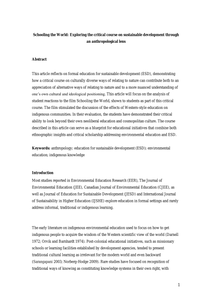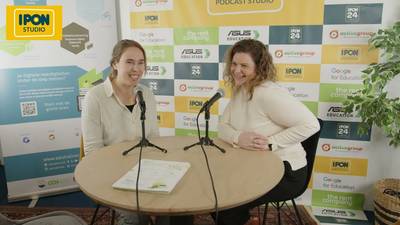This article reflects on formal education for sustainable development (ESD), demonstrating how critical course on culturally diverse ways of relating to nature can contribute both to an appreciation of alternative ways of relating to nature and to a more nuanced understanding of one's own cultural and ideological positioning. This article will focus on the analysis of student reactions to the film Schooling the World, shown to students as part of this critical course. The film stimulated the discussion of the effects of Western-style education on indigenous communities. In their evaluation, the students have demonstrated their critical ability to look beyond their own neoliberal education and cosmopolitan culture. The course described in this article can serve as a blueprint for educational initiatives that combine both ethnographic insights and critical scholarship addressing environmental education and ESD. https://doi.org/10.1016/j.ijer.2013.10.002 https://www.linkedin.com/in/helenkopnina/
MULTIFILE

Educational linguistics lays at the interface of contributions from linguistics (in our case focused on L1) and education. It aims at teaching students in compulsory schooling how to engage in fruitful reflection when facing both language in use (especially in the written mode) and language as a system, approaching language as something worthwhile exploring and targeting the development of students’ encyclopaedic knowledge about it. In this context, the educational game can be seen as a process in which specific contents are made accessible to specific learners through mediation, which comprises well-articulated conceptual systems, as well as methodological procedures, directly provided by teachers in the classroom. Nonetheless, such mediation can indirectly be provided by other agents (curriculum theorists, linguists, material designers, etc.), and this is the focus of the papers in this special issue: the role of linguistics, teachers’ beliefs and preparedness, the role of grammar in the curriculum, the concepts of sentence, and the difficulties in linking grammar knowledge and knowledge on language use. The ulti- mate goal of this special issue is to contribute a common ground for a debate.
DOCUMENT
This study utilized the Dutch translation of the Adjustment Scales for Early Transition in Schooling (ASETS), assessed in 323 kindergarten children across 30 regular schools in the Netherlands. Culturally-tailored, context-informed assessments are essential to address childhood adaptation challenges in early schooling. The analysis included EFA and CFA, revealing three behavioral problem categories: Aggressive/Oppositional (α = .86), Withdrawal/Low energy (α = .87), and Hyperactive/Attention seeking (α = .92). In addition, three situational contexts were identified: Contexts Requiring Discipline (α = .84), Contexts of Teaching and Learning (α = .85), and problems in Contexts Requiring Engagement (aka Disengagement) (α = .80). The 3-factor situational model demonstrated a good fit, RMSEA = .056, CFI = .97, and Pearson correlations highlighting distinct associations between behavioral dimensions and situational requirements.
DOCUMENT
Door de krapte op de arbeidsmarkt leiden steeds meer ondernemers zelf (potentiële) werknemers op ten behoeve van het vervullen van vacatures. In dit artikel enkele voorbeelden van ondernemers die dit hebben opgepakt.
MULTIFILE
Te gast zijn Marije Kesselring en Dorien Graas, onderzoeker en lector bij verschillende jeugdlectoraten, met wie ik spreek over het thema de pedagogische basis. Marije deed promotieonderzoek naar de Pedagogical Civil Society, een begrip dat haar promotor Mischa de Winter eerder al had geïntroduceerd en dat gaandeweg veranderd is in het begrip de pedagogische basis, naar analogie van het begrip de sociale basis. Dorien is als lector en daarvoor onder meer als betrokkene bij de Raad voor Maatschappelijke Ontwikkeling al lange tijd pleitbezorger van dit thema. De pedagogische basis is het idee dat andere mensen dan de ouders vanzelfsprekende medeopvoeders zijn van kinderen. Denk aan informele medeopvoerders zoals buurtgenoten en formele professionals zoals leraren en medewerkers van de kinderopvang. Onderliggend idee is dat opvoeden niet overgelaten wordt aan ouders en als het mis gaat aan pedagogische specialisten, maar dat we 'allemaal opvoeders' zijn. Dat is ook de naam van het overheidsprogramma dat Marije onderzocht heeft op het begrip Pedagogical Civil Society. Omdat Civil Society betekent dat burgers onderling hun zaken regelen, is de geschiktere naam pedagogische basis gekozen. Dat betekent dat andere ouders en professionals rondom kinderen mee opvoeden als onderdeel van hun professie en dat de gemeente hen daarin stimuleert en ondersteunt. Marije en Dorien pleiten ervoor dat de pedagogische relatie en pedagogisch handelen normaal is in school en samenleving en dat we met elkaar spreken en reflecteren over hoe breed ons normaal is, zodat pedagogiek niet alleen aan specialisten wordt overgelaten.
LINK
For the first time in the Netherlands, the Adjustment Scales for Early Transition in Schooling (ASETS) have been applied to kindergarten and first-grade elementary school. A study was conducted to examine the relation between the different behavioral (phenotypes) and situational dimensions (situtypes) of the ASETS and learning performance on standardized language and numeracy tests. Results show that a proportion of children experience socioemotional and behavioral problems. Among boys, in particular, emotional or behavioral problems are significant. Furthermore, results show that these problems translate into a fairly consistent pattern of negative correlations with language and numeracy performance. These outcomes support the assertion that some children are not yet ready for school. It therefore seems important that the structured academic approach that is central to many methods used in early childhood education undergoes critical reflection, as by no means all target group children are ready for this approach.
DOCUMENT
In deze podcastaflevering is Josien Boetje te gast bij Laura Walter-Goudsmit. Josien is Promovendus Digitale Informatievaardigheden & Lerarenopleider Digitale Geletterdheid bij Hogeschool Utrecht. Samen bespreken we het belang van digitale vaardigheden voor leerlingen en leraren, de ontwikkeling van een curriculum digitale geletterdheid op de lerarenopleiding, en het verlangen om praktische handvatten en inspiratie te delen. Ook bespreken we Generatieve AI en de mogelijke toepassingen in het onderwijs; met een kritische blik op de ontwikkelingen, de ethiek en de doordachte implementatie.
YOUTUBE

In the Netherlands and in the United States, the assessment process is changing for children who present learning and behavioural challenges in school. Evaluations for eligibility determinations and support planning are shifting along with disability models and tensions over the provision of inclusive schooling. Legislative edicts influence the assessment process differently in these two countries while both nations seem to be headed in a similar direction. This paper relates evolving disability models to the changing assessment process in each country and proposes that a solution-focused perspective offers an assessment concept which supports the goal of inclusive education. Specifically discussed are the implications of a solution-focused approach on the identification of disability, the assessment of special educational needs, individualized support planning, and the essential cooperation within evolving schools as well as the environment beyond.
DOCUMENT
In the Netherlands and the USA, the assessment process is changing for children who present learning and behavioural challenges in school. Evaluations for eligibility determinations and support planning are shifting along with disability models and tensions over the provision of inclusive schooling. Legislative edicts influence the assessment process differently in these two countries while both nations seem to be headed in a similar direction. This paper relates evolving disability models to the changing assessment process in each country and proposes that a solution-focused perspective offers an assessment concept which supports the goal of inclusive education. Specifically discussed are the implications of a solution-focused approach on the identification of disability, the assessment of special educational needs, individualised support planning and the essential cooperation within evolving schools as well as the environment beyond.
DOCUMENT